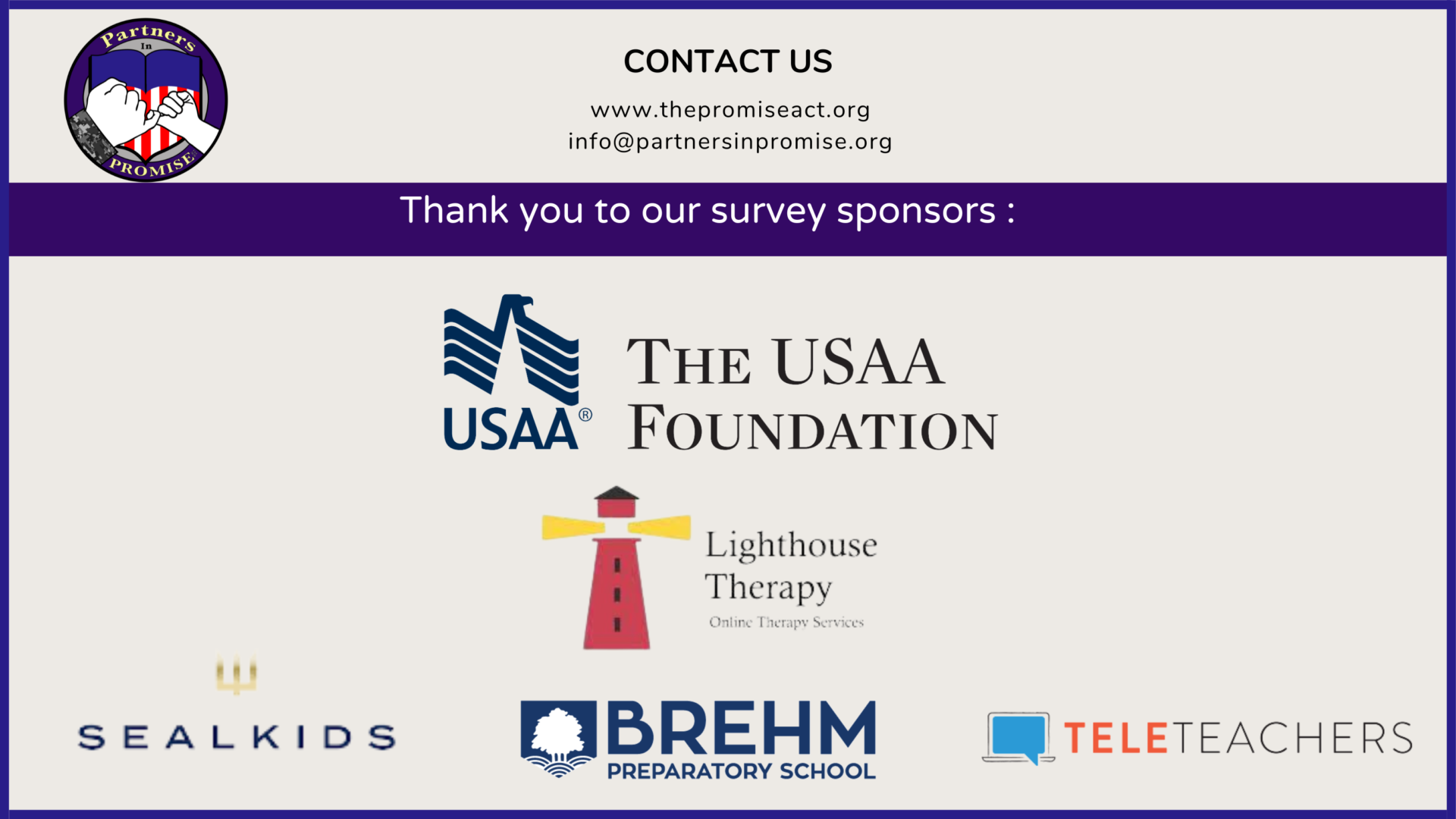
2023 Data Release Webinar
| In the News, Survey Data, Webinar
Did you miss Partners in PROMISE’s 2023 Data Release Webinar? No worries! Check out the video below.
Did you submit questions to our panelists but we didn’t get to your question? Some are addressed below, but keep an eye out for those responses in the coming weeks!
Watch the 2023 Data Release Webinar
Partners in PROMISE released its findings on March 15, 2023, alongside panelists from Joining Forces, the Department of Defense’s Office of Special Needs, the Department of Education and civilian researchers from The Ohio State University and leaders from the disability community, like the Learning Disability Association of America. We convened these experts for one reason: to bring awareness and attention to the struggles faced by military families and students in special education.
More Answers Added!
Office of Special Needs (OSN)
DoDEA Questions
- Why is it that the ABA therapists can go into the schools off-post, but not into DODEA schools?
- DODEA schools, just like public school districts, may provide their own behavioral supports for students so they tend not to allow outside providers to support the student while in the school setting.
- As is common in public school systems, DoDEA provides behavioral supports, which may include the implementation of Applied Behavioral Analysis (ABA) methodologies and a continuum of behavioral supports for student(s) based on the unique needs of the individual student and family.
- What is the process for overseas families who have children in need of special education services?
- Per DoD Instruction (DoDI) 1315.19, “The Exceptional Family Member Program (EFMP) Section 3.2:
- DoD Criteria for Identifying Family Members with Special Needs
- Family members of active-duty Service members (regardless of location) and civilian employees appointed to an overseas location eligible for enrollment in a DoDEA school on a space-required basis will be identified as having special educational needs if they have or are found eligible for either an Individualized Family Service Plan (IFSP) or an IEP in accordance with DoDI 1342.12 and DoDM 1342.12.
- In addition, DoDEA is required to engage in child-find activities to locate, identify, and screen all children who are entitled to enroll in DoDEA schools who may require special education and related services.
- DoD Criteria for Identifying Family Members with Special Needs
- Per DoD Instruction (DoDI) 1315.19, “The Exceptional Family Member Program (EFMP) Section 3.2:
- Why can’t JAG Attorneys represent parents in Due Process with DoDEA, a Department of Defense entity? Thank you!
- The scope of legal services falls within the purpose of each military Judge Advocate General (JAG) department. Legal services do not fall within the scope of DoDEA’s purview. Each respective military JAG department would be the appropriate entities regarding this inquiry.
- The scope of legal services falls within the purpose of each military Judge Advocate General (JAG) department. Legal services do not fall within the scope of DoDEA’s purview. Each respective military JAG department would be the appropriate entities regarding this inquiry.
- Why is it so hard to get special education services for disabled students at military installation schools?
- Special education services in DoDEA are not a one-size-fits-all approach. A service, rather than a classroom or location in a school building, DoDEA special education programming is a tailored program designed in collaboration with parents, community service providers, and school staff to meet the unique needs of individual students. DoDEA uses curriculum resources and innovative services that remove learning barriers for our students with the Individualized Education Program (IEP). DoDEA’s IEPs serve as the roadmap for a Free Appropriate Public Education (FAPE) and are designed to consider the unique needs of individual students.
Special education services include specially designed instruction and related services, at no cost to the parents, to meet the unique needs of a child with a disability, including instruction conducted in the classroom, at home, and during physical education; in hospitals and institutions; and other settings. As appropriate, special education also includes various related services, such as speech-language services, physical therapy, occupational therapy, and other developmental, corrective, and supportive services. Specially designed instruction means adapting educational content to meet the needs of each child eligible to receive special education services. Special education teachers and related service providers may adjust the content, intensity, duration, methodology, or delivery of instruction to address the unique needs of each child. DoDEA strives to ensure access to the general curriculum so that every child can meet the College and Career Ready Standards (CCRS) adopted by DoDEA, which apply to all students enrolled in DoDEA schools.
The DoD implements the IDEA under DoD Instruction (DoDI) 1342.12, “Provision of Early Intervention and Special Education Services to Eligible DoD Dependents,” June 17, 2015, and its accompanying Manual, DoD Manual (DoDM) 1342.12, “Implementation of Early Intervention and Special Education Services to Eligible DoD Dependents,” June 17, 2015. Both the Instruction and the Manual are also published as 32 C.F.R. §57.
- Will DODEA provide a minimum level of support for IEPs in overseas locations to help families choose locations based on support.
- Per DoD Instruction (DoDI) 1315.19, “The Exceptional Family Member Program (EFMP) Section 1.2. Policy:
- It is DoD policy that:
- The EFMP identifies family members with special needs, enrolls sponsors in the program, and participates in the coordination of assignments for active-duty Service members in order for the special needs of family members to be considered during the assignment process.
- Active-duty Service members whose families include a member with special needs must enroll in the EFMP to ensure their family members’ special needs are considered during the assignment process.
- It is DoD policy that:
- Per DoD Instruction (DoDI) 1315.19, “The Exceptional Family Member Program (EFMP) Section 1.2. Policy:
- How often are OCONUS EFMP services reviewed and potentially expanded?
- The OCONUS Exceptional Family Member Program (EFMP) services are reviewed annually and published in the DoD Directory, Special Education Services in OCONUS Communities for DoDEA and Educational Developmental Intervention Services (EDIS). The annual review includes a determination of potential expansion of services in overseas locations.
- Based on what I can tell DODEA does not publicly report alternate assessment rates. Given today’s webinar data can we expect that this will be made available in the future to help track military special education student outcomes?
- At this time, there is no requirement for DoDEA to publicly report alternate assessment data. DoDEA does provide student-level alternate assessment data to parents/sponsors.
- How can we increase accountability/visibility of what goes on at DODEA schools? Complaint system is ineffective.
- Dispute Resolution process procedures are implemented by DoDEA in accordance with DoD Instruction 1342.12., regarding (1) administrative complaints, (2) mediations, and (3) due process complaints. DoDEA closely monitors, (1) the citation of the noncompliance; (2) the root cause of the noncompliance; and (3) the corrective action(s) identified in the dispute resolution outcomes.
OSN General Questions
- While Title 10 address that services stabilize military families for a minimum of 4 years in an stabilization area, now when you look in to the DON inst for EFMP 1754.2F is does address this issue but also allows detailers the final say if a family is able remain in those areas, if the Family is CAT 5 that family shouldn’t have to prove to the detailer a second or third time that the DON has already recognized that they would have a need to stay in that stabilization area, with the extra verbage of the 1754.2F 4. (5) gives the detailers too much room to move a family that would need to keep their child receiving the care they need. this isn’t hasn’t been updated since 15 Nov 2017, i think it would be good to have this looked at and updated to better care for those kids. Also how can we get the stabilization assignment location looked at, i know in Everett Washington without the Carrier no longer homeported here a lot of services have moved out of the area and farmed out to other bases in the area, can we have this looked out. I made the choice to move to my new duty station while leaving my family back in Hampton roads to ensure my child’s safety and also in the school they are currently in.
- The EFMP does allow the ability to remain at the current installation for up to 4 years due to concerns with disruption to the continuity of medical or educational services in Alaska, Hawaii, or a continental United States assignment location when:
- The Service member initiates the request.
- There is a documented substantial risk of transferring medical care or educational services to a new provider or school at the specific time of PCS, as determined by Service-specific guidance.
- Stabilization does not adversely affect the Military Department’s mission requirements or the Service member’s career development.
- To support the need of families, updates to the EFMP will enable Service members to request a second review of all assignment decisions.
- The EFMP does allow the ability to remain at the current installation for up to 4 years due to concerns with disruption to the continuity of medical or educational services in Alaska, Hawaii, or a continental United States assignment location when:
- If a district school is located on a military base and the families are having issues with the district school, in regards to an IEP, are the parents only able to go through the District Superintendent or can military personnel such as the CG get involved?
- If there are issues with a school district, you should contact your EFMP office and School Liaison Officer to see if they may help. Procedural safeguards are given at each IEP Meeting and outline how to file a complaint with the State Dept of Education if needed.
- Parents are encouraged to work with appropriate school personnel to resolve special education issues. Enclosure 6 of the Department of Defense Manual 1342.12 “Implementation of Early Intervention and Special Education Services to Eligible DoD Dependents” dated June 27, 2015, outlines the dispute resolution and due process procedures.
- When trying to get my child’s IEP done I was fighting for support (after being told her autism did not affect their education.) A friend who worked for EFMP at FT Carson told me to ask for an IEP Advocate, but when I called, they said they do not have those here. Why do not all bases have the same services?
- All bases should have special education resources provided by EFMP staff. If the staff has no one available to help, contact Partners in PROMISE at info@partnersinpromise.org and Office of Special Needs. By law, all bases should have a special education attorney available to support families if needed.
- All Military Services EFMP Family Support offices are staffed to provide assistance to parents with questions or concerns regarding their child’s IEP. EFMP Family Support Providers support families but are not considered special education advocates.
- Do you have data on how many families with SpED issues have been helped by the JAG program?
- The Military Services installation legal offices work with the EFMP Family Support office each year to provide statistics on the number of families seeking assistance with due process actions. In Fiscal Year 2022, the Military Services reported a total of 62 cases involving due process actions across the Department.
- Ms, Barnes’ and her team’s work on standards, what is the link for learning about their work?
- Information regarding the Office of Special Need’s (OSN) efforts to enhance and improve the EFMP can be located on Military OneSource. The link is https://www.militaryonesource.mil.
- In addition, your input is integral to the future enhancement efforts. We would like to hear from you to learn more about successes as well as needs. One way to provide feedback or communicate with the Department is the Military OneSource Automated Messaging System located at https://public.militaryonesource.mil/efmpfeedback. Families can use this tool to contact the OSN with questions or feedback about EFMP or the EFMP & Me tool. An OSN representative will contact you to confirm your request was received or if there are any additional questions about your request.
- Will there be a position of inclusion specialist created for DAF Child & Youth Programs?
- In accordance with the National Defense Authorization Act for Fiscal Year 2023, the Department is developing a pilot program to introduce and measure the effect of special needs inclusion coordinators in Child Development Centers at select DoD installations. The Air Force will participate in the pilot although exact installations have not yet been determined.
- Would like to know if the Tri-care ABA will cover bringing them or helping them to participate in the community?
- For TRICARE questions related to ABA, we encourage families to email the Defense Health Agency Autism Care Demonstration at dha.ncr.j-10.mbx.dha-acd@health.mil.
- Is it lawful that Tricare requires parents to answer extremely personal questions in order to get funding for our child’s therapy?
- For TRICARE questions related to ABA, we encourage families to email the Defense Health Agency Autism Care Demonstration at dha.ncr.j-10.mbx.dha-acd@health.mil.
- How can school liaisons support our EFMP families with students attending school in a “less good” school district?
- The School Liaison Program offers various services and resources to support children and families to obtain the best possible education experience. School Liaisons connect military families with the appropriate resources for special education support, as well as, academic planning, and post-secondary education preparation.
LDAA Answers
- What are the implications of these findings for the broader special education community?
- It seems as though without uniformity in the special education process overall, geographic location will remain a critical barrier for families. Without some type of bridging policy that requires schools to accept a recent IEP from another state/district, and implement those services to the best of their ability until a new evaluation is done, highly mobile students in special education will continue to fall behind and be denied the critical services they need to succeed.
Partners in PROMISE 2023 Data Release Webinar Questions
(below was published on April 3, 2023)
- Is any of this information being shared with the MIC3 Commission to perhaps add more teeth to the compact for military special needs children?
- The report has been sent to the National MIC3 Commission but we encourage families to reach out to their state’s MIC3 representative(s) to share the report and facilitate conversations with their commissioner and respective military liaisons. If you would like more information about how to engage with your State MIC3 commission, please reach out to us at info@partnersinpromise.org.
- We are moving to Pittsburgh this summer where we will not be located in a military community. How should I prepare for that?
- LDA is headquartered in Pittsburgh and would be happy to provide you with local resources.
- Additionally, prior to your relocation, we recommend contacting the new school and their special education department regarding your child’s registration, military status, and ask if advanced enrollment is available. The key is making sure the school gets a copy of the transfer IEP as soon as possible to ensure a smooth transition and timely receipt of special education services and support.
- Director of Admissions at Brehm Prep, here, and former military spouse and mother to a child with a 504. I was surprised by the number of students determined “not eligible” for state testing. I would love to know what questions generated that particular statistical result, because my experience in educational leadership demonstrates that students are more often “excused” than “not eligible” and the tone of those two things is very different.
- Great perspective and welcome! I have seen some districts make the “determination” of a student’s participation in state testing differently. What it all boils down to is either students with disabilities take state testing or they do not. The real question is WHY they do not take state testing when accommodations can be provided.
- This is an interesting finding to me: Families whose children receive services under a 504 Plan (9.7%) or who did not receive services (16.3%) noted that their schools recognized the educational impact of their diagnoses at significantly (p=<.001) lower rates than those receiving services under an IEP (74%).
- This is an interesting stat and it highlights moments of educator-parent disagreement in how to best meet the unique needs of the exceptional military student.
- At the top of the hour, it was mentioned that a need is to encourage Congressional support. What SPECIFIC asks would be helpful?
- Thank you for your question. Based on the survey findings, there are several asks that you can find here in the final report, Page 29: https://thepromiseact.org/wp-content/uploads/Partners-in-PROMISE-2022-Research-Findings.pdf. Additionally, sharing your family story with your local/state/federal representatives about military children’s experience is essential for our community to ensure your voices are heard and that solutions can be discussed based on survey data.
- What can we do to improve outcomes?
- Get involved with Partners in PROMISE and your local/state/federal community leadership about military children in special education. Read our customized recommendations for parents, educators and military/civilian leaders (https://thepromiseact.org/wp-content/uploads/Partners-in-PROMISE-2022-Research-Findings.pdf). Tell your personal story and help elevate and support our work: https://thepromiseact.org/donate/
- What was the most surprising finding in this year’s data? Where has positive progress been made?
- One surprising finding was that despite the high stress reported by special education families, it did not significantly impact their desire to continue serving on active duty.
- We have seen positive progress with awareness in our military community and addressing the challenges our children face in special education. Also comparing the timeline delays of receiving services at a new school, we saw a small decrease in months from a 5.75-month delay in 2021 to a 4.25-month delay in 2022. We highlighted this data point last year as an IDEA violation. Although it is too soon to say there is a trend, it is positive progress.
- Is there a preferred priority in how to implement the recommendations across the identified user groups?
- Our focus is to first help the military students in special education and their families directly. We want to alleviate the stress the families endure and protect the rights of their children for equal access to an education. We understand that sustained change happens from the top-down so it truly is a multi-tiered approach.
Our Survey Data
2022
2021
2020
Partners in PROMISE’s Military Special Education Evaluation







Leave a Reply